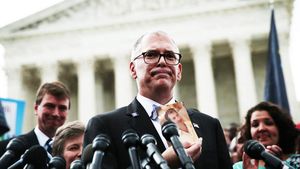If a woman came into my office for a pregnancy test and was relieved to learn the result was negative, it would be medically irresponsible of me to not at least offer information about birth control options. It would be just as irresponsible of me to not offer information about HIV prevention strategies to people who test negative for HIV.
Alarmingly, there are still many medical providers who aren’t familiar with two very effective methods to protect against HIV infection: PrEP (pre-exposure prophylaxis) and PEP (post-exposure prophylaxis). There are also those who refuse to discuss or recommend PrEP for moralistic reasons, just as some doctors refused to prescribe the birth control pill in the 1960s.
That’s why the Los Angeles LGBT Center, with AIDS Project Los Angeles, is cosponsoring a bill in the California legislature (Assembly Bill 2640) that would ensure high-risk HIV-negative individuals receive information about all federal govenrment-approved methods that reduce the risk of contracting HIV, including PrEP and PEP, during HIV post-test counseling.
Teachable moments in medicine occur when a patient has experienced a significant and bad health outcome, or has had a scare that their behavior may have caused a health event but at least this time did not. This is where studies have demonstrated the greatest effect of preventive health education.
Frankly, a law like this shouldn’t be necessary, but unfortunately it is — especially when the world’s largest AIDS service organization, the AIDS Healthcare Foundation, actively campaigns against the use of a pill for PrEP that, when taken daily, has proven to be 99 percent effective at preventing HIV infection.
There are many things medicine cannot do. We cannot cure the common cold; we cannot cure many cancers; we cannot cure HIV. But we can promote hand-washing to prevent cold virus transmission; we can provide information and assistance in quitting smoking; we can provide information to help prevent HIV infection.
Yes, there are also many things doctors are required to do in their very short patient visits. Many of these have questionable bearing on quality care. However, to be against providing information about PEP and PrEP to someone who may not be aware of it because this would add a task to a visit, or because it somehow interferes with the doctor-patient relationship, is the specious and outrageous argument that’s being advanced by the California Medical Association.
The simple fact is: medical providers are most effective when they give information that can help engage patients in their own health decisions.
AIDS Healthcare Foundation’s Sacramento lobbyist, in his Health Committee testimony against the bill, said he didn’t want to “talk about the medical science relevant to PrEP.” Bizarrely, his concern was that someone who may have little risk of being infected would be “condemned” to take PrEP “forever.”
“If a 45-year-old man who has been married for 20 years, who has a fling and panics, and goes and gets tested, and is told that he should try PrEP, he’s going to run off to his doctor and ask to be prescribed Truvada,” said Rand Martin, “which means that a man who does not need the pill will be taking it. Truvada does have side effects. It can be toxic. And so you’re condemning a person who should not be taking it, to forever having to take this pill as long as he wants to be sexually active.”
First, this bill is not a mandate to prescribe anything; it doesn’t even require the health care provider to have a conversation with the patient (though that’s what should happen). It simply ensures the patient will get written information about PrEP and PEP.
Second, this hypothetical man and his spouse are examples of two people who should know that PrEP is an option to protect themselves because a substantial proportion of new HIV infections occur within the context of a nonmonogamous gay or bisexual relationship.
Finally, there’s no reason to believe that people who don’t need PrEP will get a prescription for it simply because they’ve learned about it. But we do know, from a recent California study, that those at greatest risk of infection — black and Latino men who are gay or bisexual — are least likely to know that PrEP and PEP can protect them. And though the Centers for Disease Control and Prevention estimates that about 25 percent of gay and bisexual men should be on PrEP, the same study showed that only 10 percent have ever taken it.
Our best hope for reducing and ultimately ending HIV transmission is to ensure people know PrEP is an option for them.
I’m grateful to California Assemblymember Mike A. Gipson for introducing this bill and to the California Assembly Health Committee for supporting AB 2640. Please sign our petition to encourage the rest of the California legislature and Gov. Jerry Brown to save lives merely by reminding medical providers to be the educators we are and to share information that can keep our patients healthy.
(RELATED: AHF's Michael Weinstein Has a New Fight, and It's Not About HIV)
DR. ROBERT BOLAN is the medical director at the Los Angeles LGBT Center.



































































